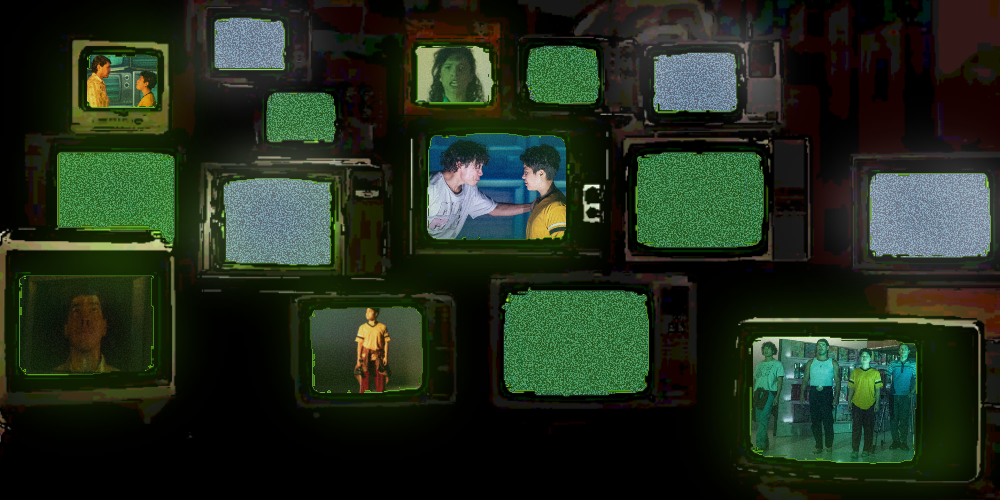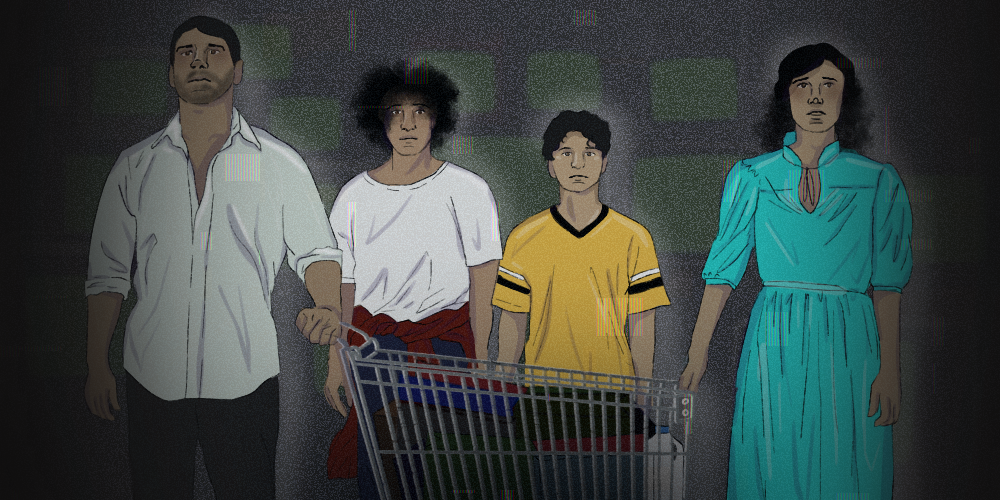Meet the Estradas. The father, Octavio (Raúl Castillo), was the first member of the family to arrive in America. After nine months of working 10-hour shifts (and having his pay docked for six of those hours because he’s an “illegal”) he finally saved up enough money “to pay coyotes so that my whole family could come over.” His daughter Erica (played by the nimble Bianca Norwood) is a tomboy entranced by cars and video games. Like many immigrant children, she’s the de facto translator for her family. Octavio’s wife Maria Ximena (an effervescent Elia Monte-Brown) is used to treating her husband as an ATM and is having an affair with a truck driver. She’s described by her daughter as “garish” but “charming.” Finally, there’s Alejandro (Crew), Erica’s brother, who worked in factories, mess halls, and other “shops of sweat” before his untimely death.
On one level, american (tele)visions, which ran at New York Theatre Workshop until Oct. 16, is a stirring memory play about an undocumented Mexican family and its unraveling. Yet the play, written by Victor I. Cazares, is also a palimpsest of several other things: an unvarnished look at the wages of late capitalism; a rebuke to anti-immigration sentiment; and a valentine to video games and telenovelas. The play is billed as “an epic multiverse where time is fluid” and the characters are also fractalized across different roles — as avatars in video games, as TVs, even, in a whimsical turn by Monte-Brown, as Wal-martina, a walking, talking barcode. Imagine someone carefully pipetting Walter Benjamin into Gabriel García Márquez with a soupçon of Philip K. Dick and setting the centrifuge on high — that would give you an idea of what american (tele)visions is like. What Walter Benjamin set out to do for the Parisian Arcades of the 19th century in The Arcades Project, full of incisive observations, philosophical fragments, and innovative uses of literary montage, Cazares does for our phantasmagorical present moment. For all its mixing of genres, the play, under the direction of Rubén Polendo, remains grounded in the story of the Estradas.
Just as the Estrada family splinters under the weight of Alejandro’s death — recounted fitfully throughout — the characters themselves cleave apart, “the way a missing tooth grows gaps between the others,” to borrow a line from the writer Namwali Serpell. Erica assumes the role of Virgil for our whistlestop tour of her family’s history; we follow her through the labyrinthine aisles of the first Walmart in America, around her family’s trailer home, and into a vertiginous video game. These sequences don’t happen linearly, but in an associative, almost aleatory fashion: one second, Octavio is screaming at the TV after watching an intimate video Alejandro made with his gay Vietnamese lover (also played by Crew), the next, Erica and her next-door neighbor Jeremy (Ryan J. Haddad) are bickering about Nintendo. The set (designed by Bretta Gerecke) is taken up by four huge storage boxes, which open to reveal half of a double-wide, the headlights of a truck, and an almost obscene cache of Barbie dolls. They also do double duty as projection screens for grainy homemade videos, video games, commercials, and more.

The play itself is partly structured as a video game. On one of the family’s shopping trips to Walmart, Maria Ximena appears to her daughter on a screen. “18 wheels of misfortune, commerce, and ecstasy spinning faster and faster” have brought her to the precipice of death and she implores Erica to rescue her at Transmountain Road. One proximate cause of her “misfortune,” we later learn, is the death of her son. A scene is cued up on a VHS tape, where Alejandro delivers a kind of proleptic eulogy for himself: “I was torn to pieces by mom and dad and I have been scattered across different worlds and different stages.” It is Erica’s mission to find “five golden gems,” one of which contains the remains of Alejandro, and give them to her mother. You’ll have to see for yourself where the quest leads. Suffice it to say that I was initially thrown by the quicksilver pivots and seeming digressions that doubled back on themselves. About a third of the way in, I realized I was making a category error. What may seem like digressions in a naturalistic drama hewing neatly to an Aristotelian arc are here nodes for transformation. The playwright Sarah Ruhl has called this type of writing “Ovidian,” which seems intuitively right. “If there can be said to be verisimilitude in Ovidian form, it is the sort that imitates dreams or the unconscious,” she wrote in 100 Essays I Don’t Have Time to Write. “The play takes pleasure in change itself, as opposed to pleasure in moral improvement.”
Pleasure, yes, but pleasure’s twin is pain. Each of the characters remains ajar to the insuperable agony that is losing Alejandro. You see this, for instance, when Erica, buzzing away about Barbies in “Layaway Land” to Jeremy in one moment, suddenly assumes a vacant expression, as if she’s been unplugged or someone has changed the cosmic channel. Those interstitial moments do crucial work; I was reminded of Karla Cornejo Villavicencio writing, in her landmark book The Undocumented Americans that as an undocumented person, she “felt like a hologram. Nothing felt secure. I never felt safe. I didn’t allow myself to feel joy because I was scared to attach myself to anything I’d have to let go of.” To lose a brother, one might say, is to feel like a hologram squared.
As I write, tens of thousands of migrants from the U.S.-Mexico border seeking asylum are being bused to New York City and Washington, D.C. every day. They are being ignominiously treated as pawns, or “political pinatas” by the governors of Texas and Arizona to make a point about the nation’s broken immigration system. As I walked out of the theater and made my way home, I couldn’t help thinking how the appeals of some of the families I ran into in Washington, D.C., where I live, resonated with the story of Erica’s family. There’s a thin, but undeniable filament of electricity that connects them, and perhaps others who emigrated to America and have had to contend with various struggles: negotiating the bureaucratic tangles of becoming legal immigrants; living under the radar of federal and local officials who have the power to deport; struggling to stay afloat despite the poverty that often accompanies life without papers.
The story of undocumented Americans is implicitly tied to a meta-narrative about progress and regression in American immigration policy. What does it say about us as a nation, for instance, when thousands of children become stuck in foster care because their mothers and fathers get deported, or when child welfare officials refuse to reunify a U.S.-citizen child with their deported parent? Droning away in the background of many news stories about undocumented Americans is the assumption that they are trying to become part of the U.S. Less common are narratives that take as a starting assumption that immigrants are the United States. Against the backdrop of our nation’s fractious politics, american (tele)visions is a glorious reminder that they are. •




